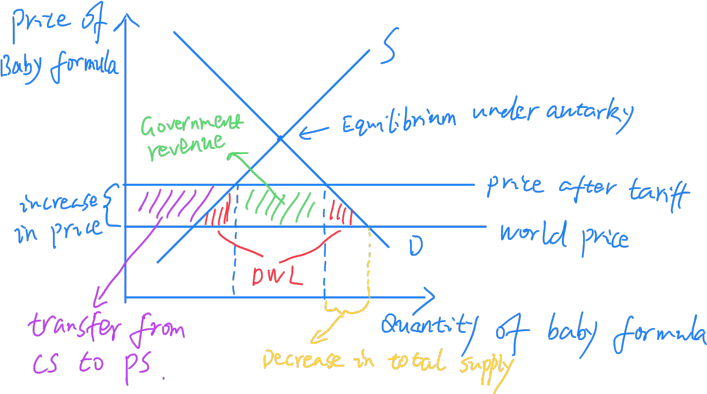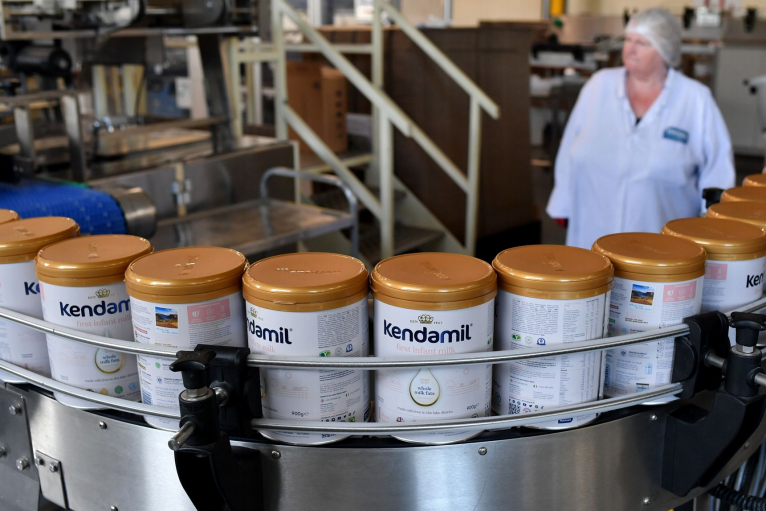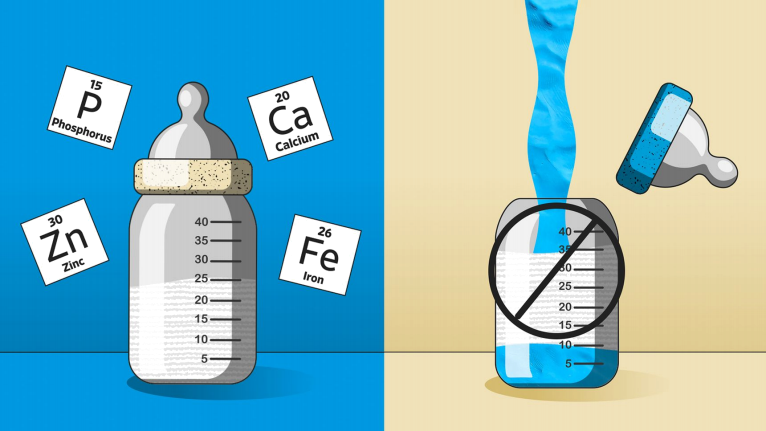Econ 201 E Baby-Formula Imports to Face Tariffs Again in 2023
Hello, dear friend, you can consult us at any time if you have any questions, add WeChat: daixieit
Writing Assignment 1
Econ 201 E – Winter 2023
Article Title: Baby-Formula Imports to Face Tariffs Again in 2023
Article Summary
The article discusses the expiration of a temporary waiver on tariffs for baby formula, which can reach as high as 17.5%. This waiver was implemented to address supply chain issues and the closure of a crucial factory that had impacted the availability of baby formula. However, as supplies have improved, the U.S. dairy industry, which produces ingredients for baby formula, is now pushing for the waiver to be lifted. Despite some improvement in availability, parents are still reporting difficulty finding formula in stores. Experts are concerned that reinstating tariffs could make formula more expensive and harder to find for consumers, ultimately harming their interests.
Economic Analysis
In lecture 2, we learn about the impacts of import tariffs and quotas on international trade through a supply-demand analysis. These measures can lead to market inefficiency, as they raise domestic prices and decrease the total supply of imported goods, resulting in a transfer of consumer surplus to producer surplus and a decrease in overall surplus due to the deadweight loss incurred by the tariffs. In the case of the U.S. baby formula market, these tariffs can lead to a shortage of baby formula, making it harder for parents to find the products they need and increasing the price of the product. A graphic analysis is provided for further illustration.

In the lecture, we also learn that despite the general support for free trade among economists,
governments may still implement trade protection policies. One argument for these policies is that they may lead to job creation in related industries. For example, tariffs on imported baby formulas may encourage consumers to buy more domestically made products, increasing domestic production and creating jobs within the domestic baby formula supply chain, including the dairy industry which produces ingredients for baby formula. However, this argument has been criticized by economists as it can lead to job losses in other industries. For instance, a decrease in imports may decrease demand for international shipping, resulting in fewer jobs in that sector.
Trade protection policies may also have a positive impact on technological progress within the protected industry. With tariffs in place, domestic producers may have increased revenues, which can be invested in research and development in related areas. This can increase the likelihood of technological innovation and improvements in production efficiency. In the case of the U.S. baby formula market, where there has been a past shortage of supply, it may be crucial for companies to increase production efficiency and make more products available to American parents. In this sense, protecting domestic producers could be seen as beneficial for promoting technological progress in baby formula production.
Baby-Formula Imports to Face Tariffs Again in 2023
Temporary exemptions put in place during a U.S. shortage will expire soon, as supply improves
By Liz Essley Whyte, Kristina Peterson and Jesse Newman
Dec. 28, 2022 8:22 am ET

Congress waived tariffs, which can be as high as 17.5%, to help families struggling to find formula after supply-chain problems and the closure of a crucial factory crimped supplies. A White House spokesman said the tariff waivers doubled the number of manufacturers selling baby formula in the U.S. Congress made the tariff waivers temporary as part of a deal to pass the measures quickly, said people familiar with the matter.
The availability of powdered baby formula in U.S. stores has improved in recent months. Out-of-stock levels fell to 14% in October from 30% in July, according to the most recent data from market-research company IRI.
 The U.S. dairy industry, which makes ingredients for baby formula, had urged lawmakers to let the tariff suspensions
The U.S. dairy industry, which makes ingredients for baby formula, had urged lawmakers to let the tariff suspensions
![]() Catch up on the headlines, understand the expire. Jim Mulhern, chief executive of
Catch up on the headlines, understand the expire. Jim Mulhern, chief executive of
inbox every day. the National Milk Producers Federation,
wrote to lawmakers in November that the supply had improved enough to allow for a return of the tariffs.
Some parents are still reporting empty shelves. Grocer Kroger Co. said on Dec. 1 that supply-chain problems remain. And families are finding fewer brands, sizes and formats of formula in stores. Manufacturers such as U.K.- based Reckitt Benckiser Group PLC, which produces formula in the U.S. and has been importing more supplies from overseas factories, said it has adjusted production to make more of a narrower product range. Supermarkets sold an average of 43% fewer formula products per store weekly as of Nov. 20, compared with the same period in the previous year, IRI data showed.

Jim Mulhern, chief executive of the National Milk Producers Federation, says the supply of baby formula has improved enough to allow for a return of the tariffs.Photo: Gabe Palacio for The Wall Street Journal
Reckitt’s Enfamil formula has picked up most of the market share Abbott Laboratories has lost since recalling its Similac and other formulas in February because of safety concerns, according to IRI. Nestlé SA’s Gerber and private-label brands have made smaller gains. Enfamil is the top brand by sales with about 43% of the market, IRI said.
Reimposing tariffs could make formula more expensive and harder to find, said Erik Peterson, managing director for consulting firm Kearney’s Global Policy Business Council think tank. “Neither is in the interest of the U.S. consumer,” he said.
Formula maker Kendamil said it factored a return of the tariffs into its plans to send six times as much formula to the U.S. in 2023 than in 2022. Executives said the company won’t raise prices commensurate with tariffs. “There’s no world in which we’ll be adjusting prices 20%,” said Kendamil co- founder Will McMahon.
SHARE YOUR THOUGHTS
Should tariff waivers on imported baby formula be extended? Why or why not? Join the conversation below.
Special exemptions for importing baby formula are also set to expire on Jan. 6 unless companies pledge to work to meet full Food and Drug Administration requirements. If they do, they can stay in the U.S. market through 2025 while they work to comply with FDA rules. The FDA said some companies have set plans to work toward meeting U.S. standards. The agency didn’t name them or give an exact count.
Another flexible formula rule could go away in February. The Agriculture Department said in a recent letter that it might stop allowing families to use the Women, Infants and Children supplemental nutrition program, which provides formula at no cost, to buy brands that haven’t struck a contract with each state.
“Every effort to ensure formula is on store shelves creates a compounding net positive,” said Jamila Taylor, president of the National WIC Association, which represents providers to the federal program.
Do’s and Don'ts During a Baby-Formula Shortage

Do’s and Don'ts During a Baby-Formula Shortage
A U.S. baby-formula shortage has some desperate parents driving hours in search of supplies. Dr. Steven Abrams, a pediatrician at the University of Texas at Austin, explains what parents should and shouldn’t do amid the crisis. Photo illustration: Laura Kammermann
Advertisement - Scroll to Continue
Write to Liz Essley Whyte at liz.whyte@wsj.com and Jesse Newman at jesse.newman@wsj.com
2023-01-31